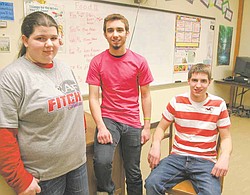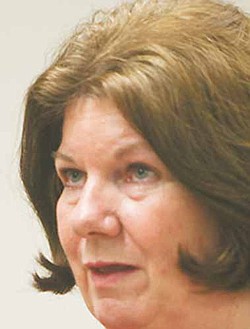Schools lose funding for anti-drug program
Austintown Fitch High School students Kimberly Bennett, Francis Trio and Jason Miller volunteer in various Safe and Drug-Free Schools programs.
Peggy Bennett
By Kristine Gill
AUSTINTOWN
Coordinators of Austintown’s Safe and Drug-Free Schools program say it could end next year if the district doesn’t find a way to fund it.
The federal government used to give thousands of dollars to Ohio schools annually to maintain the life-skills programs credited with reducing drug use in schools and promoting positive behavior in students. But federal funding stopped last year, and the program is now run with volunteers, said Peggy Bennett, family and consumer-science teacher and coordinator for the program.
“It’s not going to happen next year. People aren’t going to volunteer. I think their hearts are there, but their hands are tied,” said Bennett, who is hoping for private donations to maintain the programs.
The U.S. Department of Education provided the grant for 23 years, beginning in 1987 with about $290 million to spread among schools across the country. That increased to $560 million before it began to steadily decrease and was cut completely. Austintown’s program began in 1981.
In the 1990s, Austintown received about $70,000 a year. During the last year of funding, 2009-2010, the district got $13,000.
“They’ve done a good job adjusting,” Superintendent Vince Colaluca said of the program coordinators.
Now, schools have to compete for federal grants that provide a year’s worth of funding. No money is available for prevention programs from the state.
A few private donations have helped Austintown’s programs stay afloat this year, but there is no money for transportation, speakers, materials and the $250 to $500 stipends given to 17 teachers involved.
Kristin O’Neill, a special- needs teacher at Fitch High School and building coordinator there, said she’s worried about what students will do without programs such as I CAN, a program for at-risk students.
“We have seen miracles in there in changes of people, of kids who were hurting for so long ... it’s made us better people,” she said.
Bennett is applying for other competitive grants to try to save the program. The district competed in the Pepsi Refresh Grant competition for $50,000 in November but did not win.
“She has run herself ragged,” O’Neill said of Bennett. “It has been an emotional roller coaster with this because we are so passionate about these programs.”
Austintown isn’t the only district reacting to the loss of funding.
Karen Kannal works full time as parent-outreach coordinator for the programs in Boardman. Federal funding paid her salary, but the district picked up that cost when funding stopped.
“I think everybody was worried about this position mainly because the drug situation hasn’t gone away. It’s certainly there and very pronounced,” she said. “But that being said, most federal programs and grants are paid for a period of time with the idea that the district picks it up.”
Though her position is still intact, Kannal said she’s had to split her time differently to focus on those programs she thinks are most important. She doesn’t visit classrooms as often and said she’s spread thin among seven schools.
“I think all schools would like the money back. I don’t see it happening,” she said.
Student volunteers say participating in the Austintown program has benefited them.
Junior Francis Trio attended the I CAN program to support two of his friends who had to attend.
“It gives a lot of motivation,” he said. “Without that program, they might not get the motivation they need.”
Trio said he still looks at the cards he saved from one of the exercises where students wrote positive things about one another.
Senior Kimberly Bennett, Peggy’s daughter, is a volunteer and visits kindergarten students. She still remembers the time an older volunteer visited her kindergarten classroom.
“It builds their self-esteem, but it also builds ours,” she said.
Senior Jason Miller has been a peer mediator since sixth grade and works with students to solve issues of bullying. Without such programs, he worries problems could escalate.
“I think fights would be resolved, but they would not be resolved properly,” he said, adding that students could end up suspended or in more serious altercations.
 43
43


